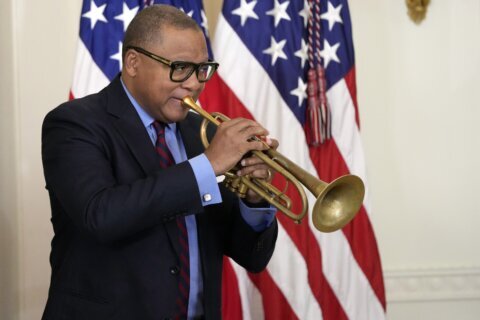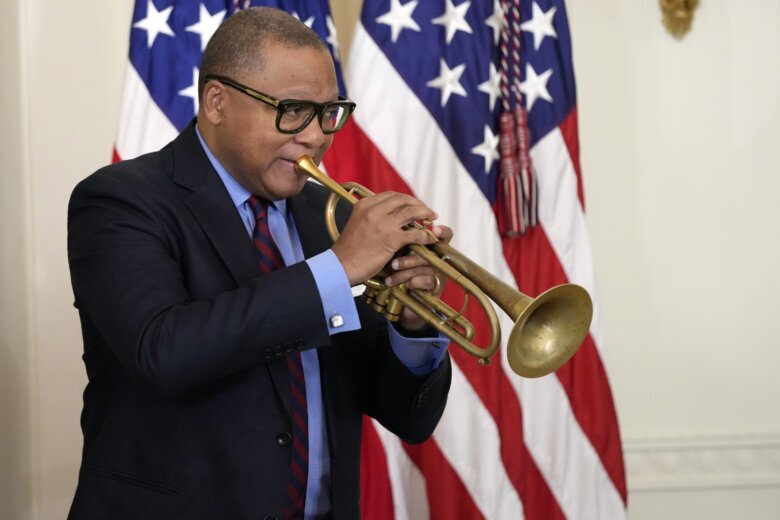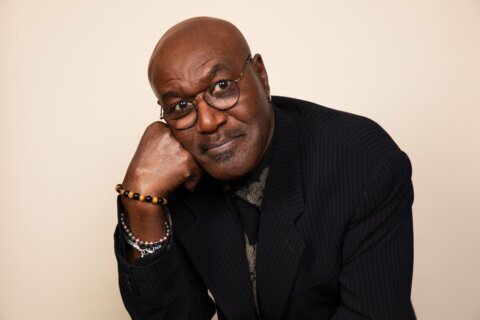Witness jazz greatness firsthand at one of Northern Virginia’s most beloved venues this week.

Nine-time Grammy winner Wynton Marsalis performs live at Wolf Trap in Vienna, Virginia, on Thursday, performing with The Jazz at Lincoln Center Orchestra from New York City.
“We have a lot of original composers and arrangers,” Marsalis told WTOP. “We’re going to be playing some of my music, the music of Duke Ellington and members of our orchestra. We have eight arrangers in our orchestra, so it’s unprecedented. One of our most favorite places to play is Wolf Trap. I mean, I can remember gigs that I played at Wolf Trap in the 1980s and 1990s, just soulful with people loving the music. So we look forward to it.”
Born in New Orleans in 1961, Marsalis grew up in a musical family as the son of a music teacher, Ellis Marsalis Jr., who named him after classic jazz pianist and composer Wynton Kelly. Marsalis’ brothers, Branford, Jason and Delfeayo, would all become musicians.
“My father was struggling to play modern jazz, so it was a real eye-opener,” Marsalis said. “To be honest with you, when I was a kid, I didn’t like the style of music that they were playing, but through the exposure to it, I started to understand what the music was about. When I got to be around 11 or 12 years old, I got into the music studies of Sonny Stitt, John Coltrane.”
By age 14, Marsalis was performing with the New Orleans Philharmonic, and by age 17 he was one of the youngest students ever admitted into the prestigious Tanglewood Music Center in Lenox, Massachusetts.
“Being in New Orleans, I had a chance to play everything,” Marsalis said. “I played New Orleans jazz sometimes in parades, I played trumpet with the New Orleans Philharmonic, all the gigs like the ballet or the circus, being in the city allowed me to get a lot of experience. Then I got called for a jazz gig when I was a sophomore playing Chick Corea’s music and the music of Freddie Hubbard and that’s where I really learned about playing the music.”
In 1979, he enrolled at The Juilliard School but left in 1981 before earning his degree, getting plenty of schooling by touring Europe with Art Blakey’s band The Jazz Messengers, followed by a tour with the great Herbie Hancock.
“From Art Blakey, I learned the value of integrity, because he had integrity and belief,” Marsalis said. “From Herbie, I learned to listen to everybody. I once saw Herbie listen to a young composer from South Africa. … He sat down at the piano after soundcheck before a gig and spent almost an hour working through this tune. … Just to see Herbie take that type of time was a lesson, there was something about his humanity and interest in people.”
Soon, Marsalis would become a jazz star in his own right. Throughout the 1980s, he won a whopping eight Grammys.
“I wasn’t really big about the Grammys and awards,” Marsalis said. “People are voting and there’s no way they can hear all the music that’s sent to them, so that’s a nice social event to go to and put a tuxedo on, but it doesn’t have anything to do with music really.”
In 1995, the same year that Branford performed at Cal Ripken Jr.’s streak-breaking game in Baltimore, Wynton won a Peabody Award for his NPR radio series and PBS TV series.
“It was great,” Marsalis said. “It was with National Public Radio and I loved the team of people that I worked with. Still to this day, one of the highlights of my life was to work with that fantastic team of people on the series called ‘Making the Music.’ There was also a TV show we put out, but that was with (PBS), BBC and NHK Japanese television called ‘Marsalis on Music.’ Those two series came out that same summer.”
In 1997, Marsalis made history again as the first jazz artist to ever win the Pulitzer Prize for Music for his two-and-a-half-hour jazz oratorio “Blood on the Fields,” which was commissioned by Lincoln Center.
“I had a lifetime of studying slavery, but it was the first time I tried to write voices for a big band,” Marsalis said. “It was an oratorio about American slavery. It was a really long piece based on a story called ‘Freedom’s a Hard-Bought Thing.’ It had a lot of different music in it. I went all the way back to molds they were using even in slavery times as a counterpoint to contemporary music that I had grown up playing, so it was a very complex composition.”
In 2000, he won his ninth Grammy for his spoken-word children’s album “Listen to the Storytellers,” and in 2001, he was named a U.N. Messenger of Peace. In 2005, he received the National Medal of Arts from President George W. Bush, then the National Humanities Medal from President Barack Obama in 2015. The National Endowment of the Arts also named him an NEA Jazz Master, but through it all, he remains humble about his place in jazz history.
“The greatest honor for me is the way that I’ve been treated by people whose homes I went into, the younger musicians I’ve played with, the great musicians around the world that I’ve had the opportunity to play with,” Marsalis said. “You can’t put yourself in the context. There’s so many great musicians who have played, so many great people in the arts. I’m just trying to get better. The older you get, the more humble you have to become.”
Listen to our full conversation on the podcast below:
Get breaking news and daily headlines delivered to your email inbox by signing up here.
© 2024 WTOP. All Rights Reserved. This website is not intended for users located within the European Economic Area.









